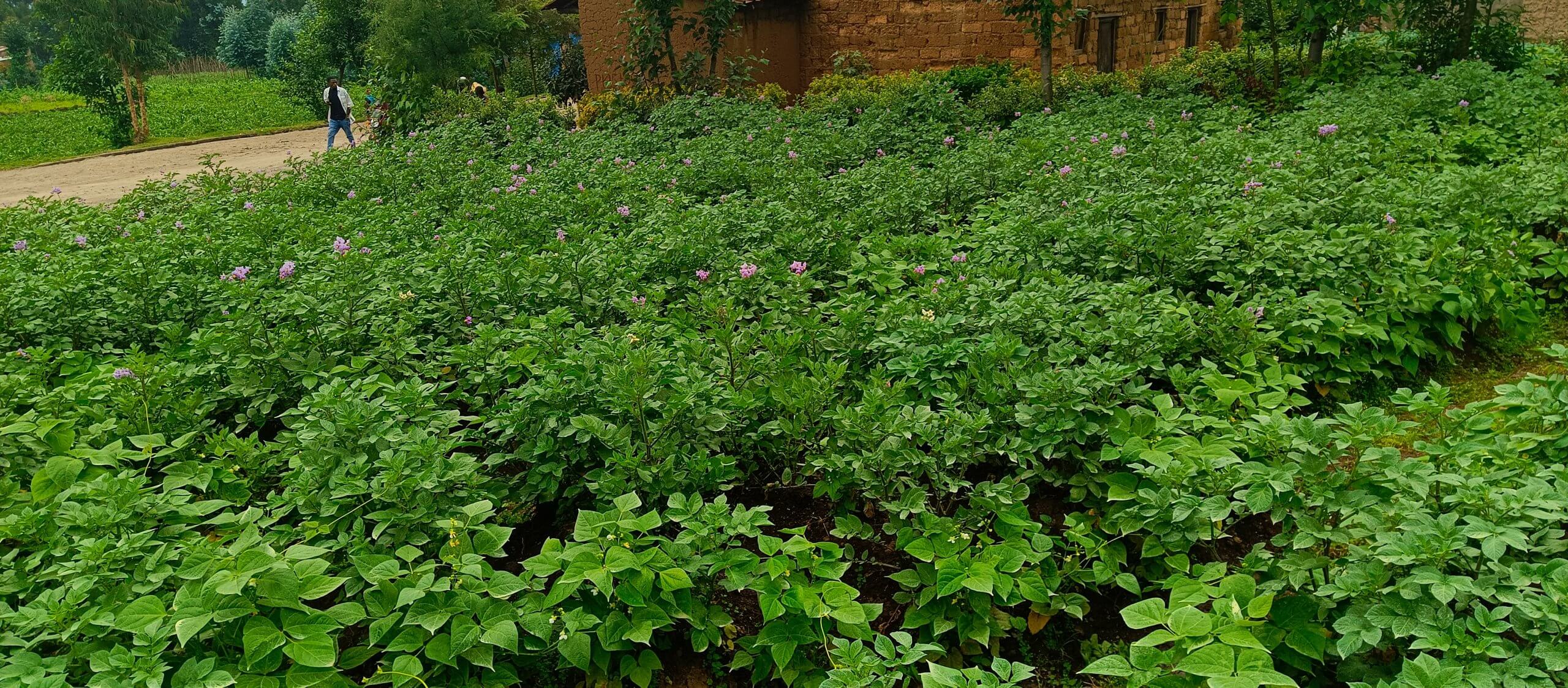How ASARECA, European Union and World Bank last mile initiatives are flashing a ray of hope to Rwandan Potato farmers
BY BEN MOSES ILAKUT
MUSANZE, RWANDA: Farmers in Shingiro in Musanze District, Rwanda are upbeat following an unprecedented bumper harvest of the much-coveted potato varieties Cyerekezo and Ndamira. During the first week of June 2025, the farmers, most of them members of Dukomeze Ubuzima Cooperative facilitated by ASARECA, Seed Potato Fund-Ikigega (SPF-Ikigega), and Rwanda Agriculture and Animal Resources Board (RAB), held a farmer field-day to harvest new entrants to their seed stocks—Cyerekezo and Ndamira.
Harvest delivers impressive results
After the farmer field-day, which was proceeded by three days of harvest, sorting, and weighing in 11 demonstration plots spread all over the volcanic Shingiro location, the output of the new varieties was declared. Cyerekezo yielded 27.3 t/ha, while Ndamira produced 24.5 t/ha. “This implies that from the 1.3 tonnes of seed that was used to establish 1 ha of on-farm demonstration fields, farmers were able to harvest 25.9 tonnes of potato (three quarters of which was seed potato),” says Mr. Moses Odeke, ASARECA’s Acting Head of Programmes, who led a team of consortium partners to record the harvest plot-by-plot. This bountiful harvest is more than double the national average of on-farm potato yields in Rwanda. According to Mr. Vincent Sinduhunga, the Chief Executive Officer SPF-Ikigega, the output was not a miracle, but a product of deliberate actions backed by research, correct partnerships and committed farmers.
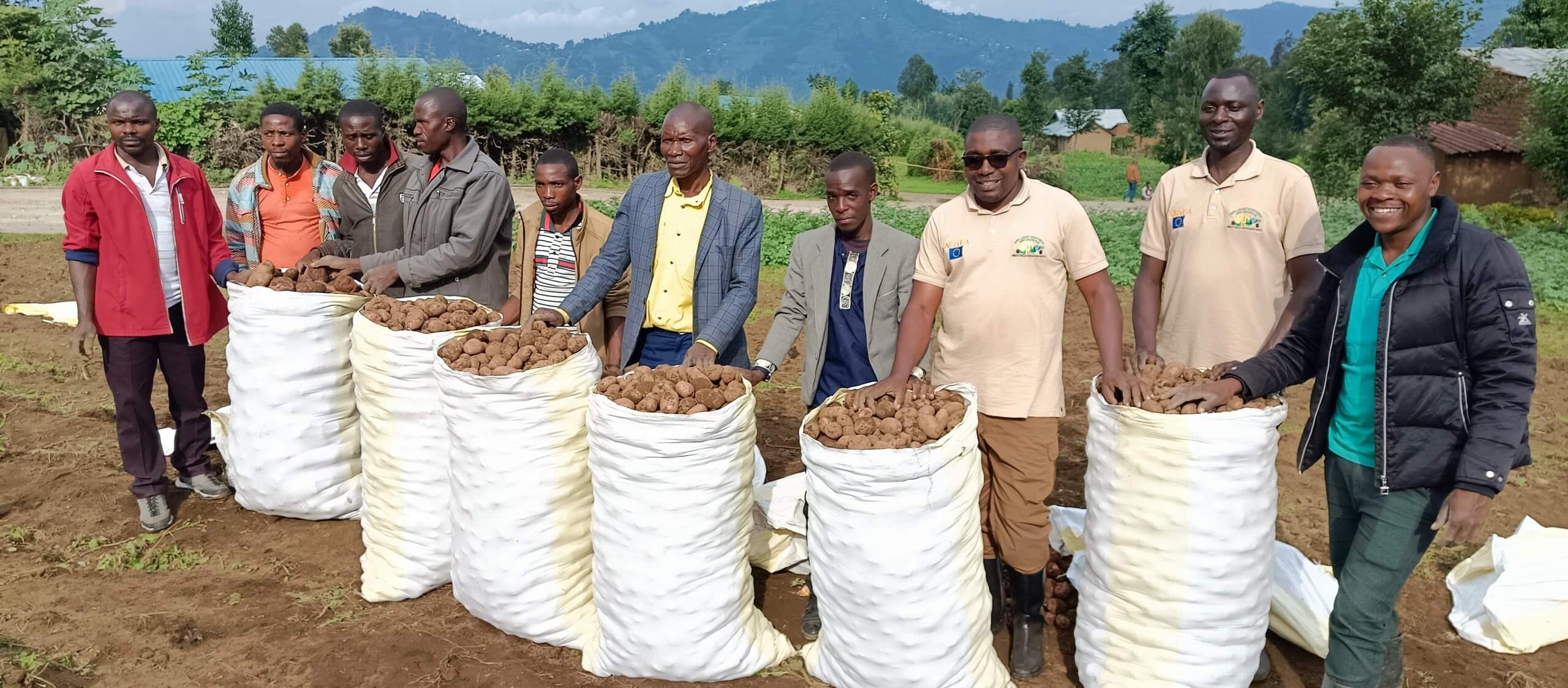
Capacity strengthening
“We recognized from the start that training including on farm demonstration was critical in realizing the potential of quality seed. That is why farmers have been able to realize yield increases from 8 tonnes per hectare to 25.9 tonnes per hectare,” Mr. Sinduhunga, asserts. “Cyerekezo actually has a yield potential of up to 30 tonnes.”
Why potato
Potato is one of the most important food and cash crops in Rwanda. It covers 50,000 to 60,000 ha estimated at 3.9 percent of total cultivated land. Rwandans eat more than 145 kg of potato per capita per year. The country is blessed with volcanic soil which is suitable for growing crops. However, average on-farm yields of potato are less than half the potential yields because most farmers plant poor quality seed. To address the shortage of quality seed, RAB released 11 new potato varieties in 2019 and 2020 with good agronomic attributes such as high tuber yields, nutrition, short maturity periods, drought tolerance, and resistance to common diseases such as late blight and potato viruses. The varieties are Jyambere, Cyerekezo, Ndamira, Twigire, Gisubizo, Seka, Nkunganire, Ndeze, Twihaze, Kazeneza, and Izihirwe.
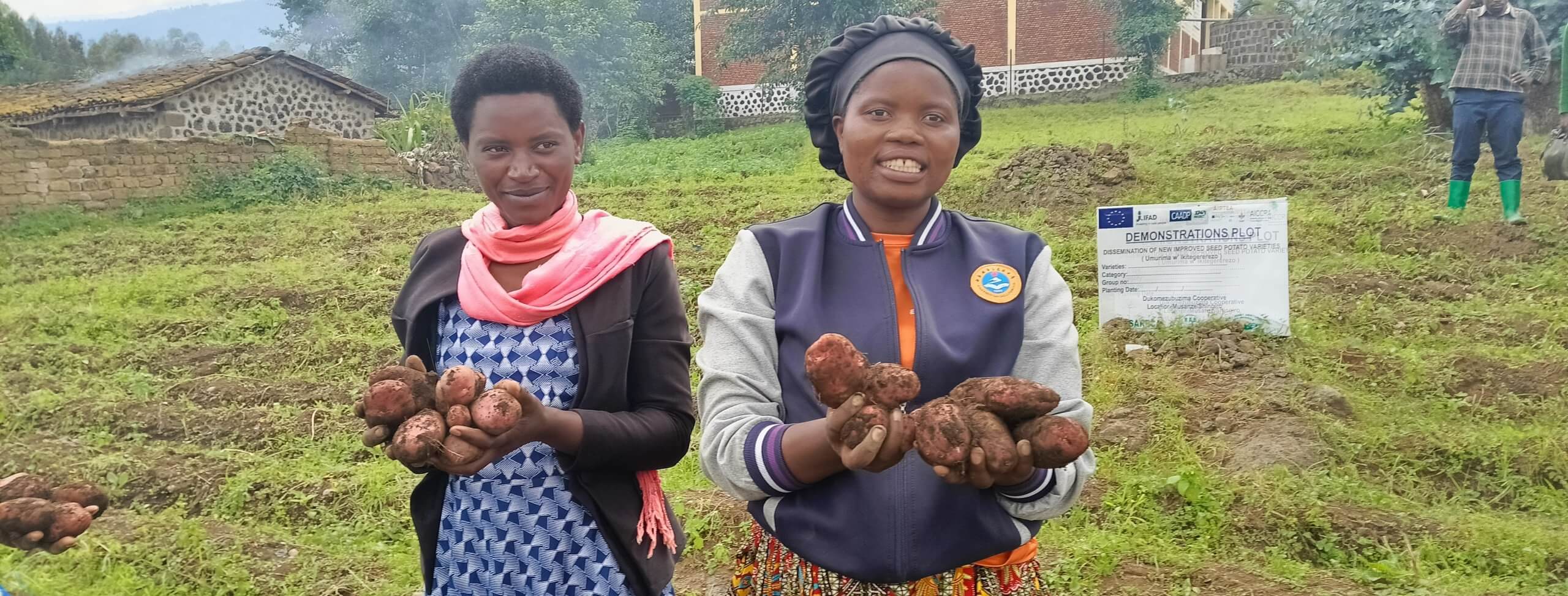
“The farmers throughout Rwanda commonly grew three varieties, Kinigi, Gikungu, and Namawondo. After releasing new varieties, the next challenge was how to get them to the farmers,” says Dr. Anastase Nduwayesu, a potato researcher at RAB. “Through training and demonstration on farmers’ plots, researchers alongside farmers have been able to confirm that the new varieties—Nadmira and Cyerekezo are superior to the traditional varieties in all attributes,” he observes.
Tackling slow uptake of new technologies
Indeed, despite new varieties having been released over 5 years ago, their adoption among smallholder farmers including youth and women remained relatively low due to the high cost of quality certified seed, limited knowledge on the availability of the new varieties, and limited technical knowledge in Good Agronomic Practices for potato production.
In order to stimulate adoption of quality and climate smart potato in Shingiro in Musanze District, ASARECA mobilised support from Development partners—the European Union—through the Comprehensive Africa Agriculture Development Programme (CAADP-XP4) Programme, and—the World Bank—through the Accelerating Impacts of CGIAR Climate Research for Africa (AICCRA) Project to sensitize and train farmers on the benefits of adopting good agronomic Practices alongside the new varieties.
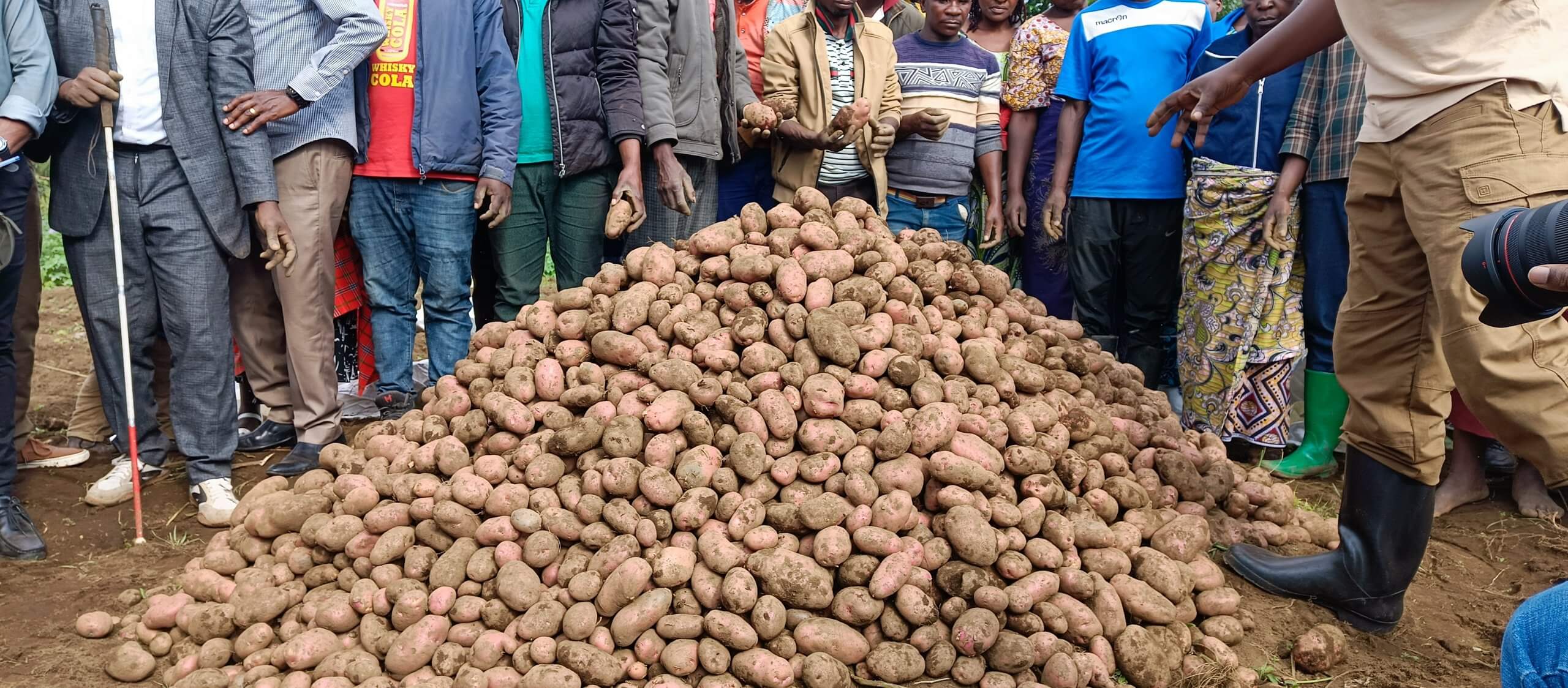
Leveraging European and World Bank funding
“By virtue of its focus on capacity strengthening, the CAADP-XP4 programme managed by IFAD, offered us an opportunity to leverage resources to support national level partners, RAB and SPF-Ikigega to build the capacity of farmers belonging Dukomeze Ubuzima Cooperative to utilise the varieties,” says Dr. Sylvester Dickson Baguma, ASARECA Executive Director. “Similarly, the AICCRA project which is implemented by the CGIAR with intent on strengthening technical, institutional, and human capacities to enhance transfer of CSA information, decision-making tools, and technologies to the last mile, provided resources towards delivering technologies to the farmers.”
According to the Dr. Telesphore Ndabamenye, the Director General RAB, ASARECA brought together various partners to understand how research, the Private sector and other value chain players can be key drivers, especially in the generation, multiplication and transfer of technologies to farmers.
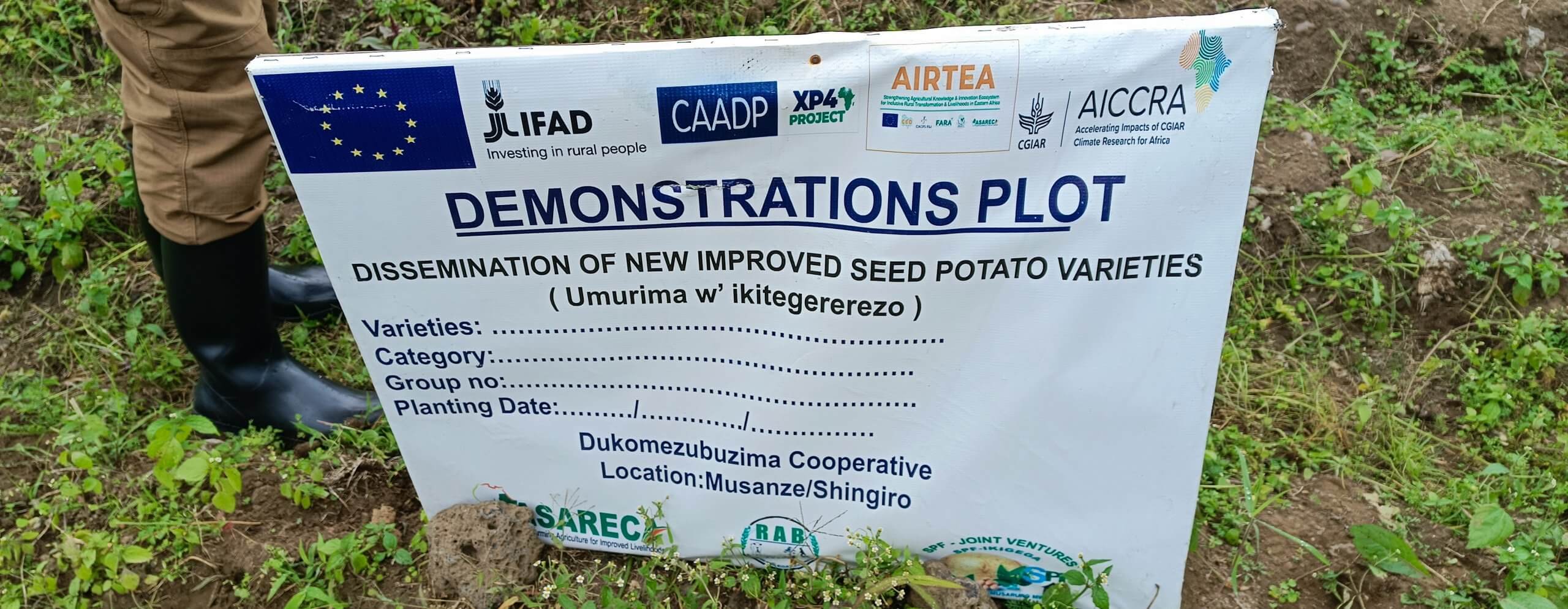
Funding stimulates action
With the new varieties and funding from the European Union and World Bank at hand, ASARECA worked with a consortium comprising the RAB, SPF-Ikigega, Early Generation Seed Potato (EGSP), Institute of Applied Sciences of Ruhengeri (INES-Ruhengeri and members of Dukomeze Ubuzima Cooperative to roll out the much-prized varieties. Mr. Evariste Nsabimana, an agronomist at SPF-Ikigega explains that the farmers received training on good agronomic practices including selecting quality seed, how to apply fertilizer and pesticides, manage harvest, and handling of seed storage.
Farmers acknowledge improvements
Various farmers confirm the impact of training. “We have learnt how to plant potato in rows and using appropriate spacing of 25- 30 cm,” says Agnes Dusabimana, a youth farmer. “I used to plant 70kg from my own saved seed and harvest dismal quantities hardly enough for food,” says Epiphanie Ususanaze, another farmer. “…but after receiving training and participating in demonstration activities, everything changed for the better.” This is corroborated by Ms Jeannette Nyiramugusha who testifies that she didn’t know how to plant potato in rows and required spacing, just as she was oblivious of any problem with planting randomly in terraces and ridges. “I had no clue that organic manure should be buried under the soil, while chemical fertilizer should be sprinkled on top of the soil. I previously mixed all the fertilizers and buried them in the soil which led rotting of the potato seed,” she explains.
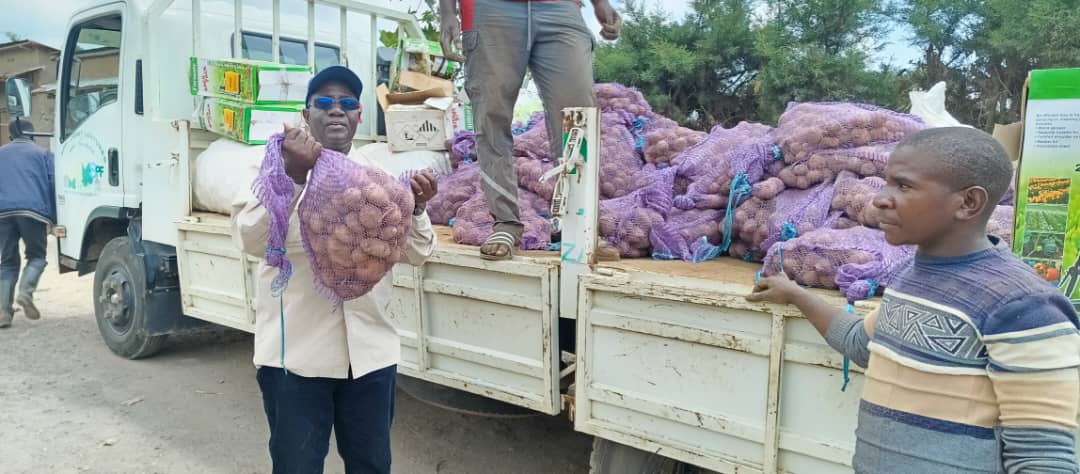
ASARECA provides starter-packs
ASARECA handed over 2.5 tons of Quality Certified potato seed, 11 spraying pumps, 200kgs of fertilizer, and assorted pesticides to 300 farmers belonging to the Dukomeze Ubuzima Cooperative, during the demonstration in Shingiro on February 12, 2025,
According to Ms. Julian Barungi, the Programme Officer in charge of Policy at ASARECA, “as a lead implementer in the sub-region, ASARECA is at the forefront of strengthening partnerships to facilitate access to quality seed and ensure seed is delivered to farmers with accompanying agricultural inputs and Good Agronomic practices through last mile (farmer) demonstration and learning.”
Building upon AIRTEA foundation
These initiatives build on the success of the AIRTEA project which started in 2021 with a focus on strengthening capacities of youth and women involved in multi-stakeholder Innovation Platforms (IPs).
Dr. Joshua Okonya, the Programme Officer in charge of Technologies and Innovation—ASARECA, who has been at the forefront backstopping AIRTEA in Uganda, Kenya and Rwanda alongside consortium colleagues from the Forum for Agricultural Research in Africa (FARA), and the Eastern Africa Farmers Federation (EAFF), notes that ASARECA sought resources from complementary projects—CAADP-XP4 and AICCRA to ensure a full package of interventions including, sourcing seed from the private sector, sensitizing farmers on the benefits of the new varieties, training them on good agronomic packages, and backstopping establishment of demonstration plots on farmers’ fields.
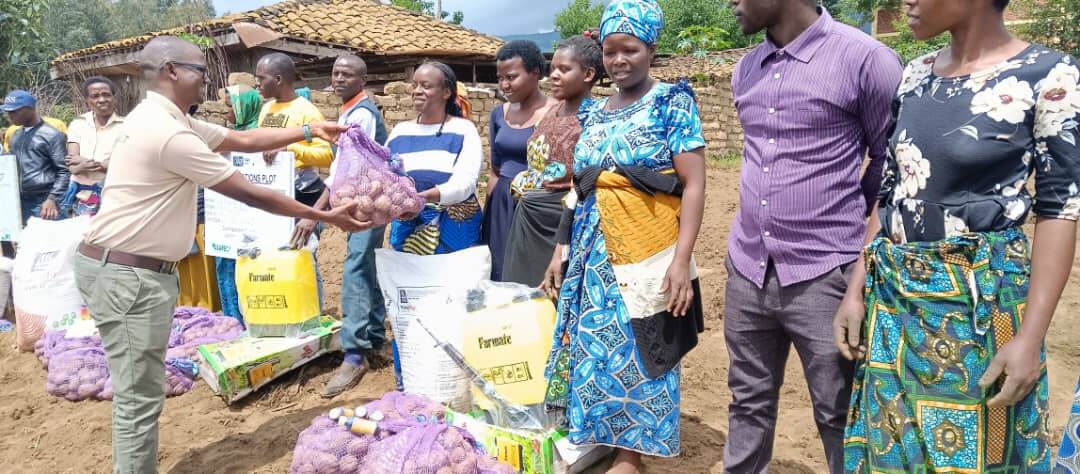
Hands on empowerment
As part of the empowerment, the consortium joined the farmers in establishing 11 on-farm demonstration fields as learning sites for farmers within the community on the benefits of using certified seed in combination with good agronomic practices such as land preparation, plant spacing, proper use of fertilizers and pesticides. This intervention deliberately targeted Dukomeze Ubuzima cooperative, that is comprised of mainly of people with disabilities, women and youth.
The potato plots three weeks before harvest. The foliage of the potato plant was cut off at the base two weeks before harvest (dehaulming) to enable the skin of the tubers to harden
Increasing incomes and livelihoods
According to Mr. Jean Damascene Sinzabahereza, the President of Dukomeze Ubuzima, the Innovation Platform, which later evolved into a cooperative, was established in 2022 under AIRTEA with a focus on empowering people with disabilities to be productive. It comprises 320 members 220 of them PWDs. “People with disabilities are now empowered to produce high quality seed,” Mr. Sinzabahereza attests.
Deploying digital tools for market access
The initiative also brought on board One Basket Online, a developer of market information applications to sensitize farmers on the use of digital applications for the market based on anticipated increase in potato yields. According to Mr. Geffrey Kamali, the CEO Online Basket online, once the farmers begin producing adequate quantities, they will be registered to capture their location, phone contacts and enterprises, and connected directly to the buyers thereby bypassing middlemen.
The bountiful harvest
Three and a half months since the planting, and true to the early maturity attributes of the new varieties, ASARECA and partners joined the farmers in a farmer-field-day-setting early June 2025 to harvest, observe, take note of and validate the anticipated productivity levels, and showcase the achievements among the cooperative members and non-project beneficiaries with a view to further disseminate the two climate smart varieties of Cyerekezo and Ndamira.
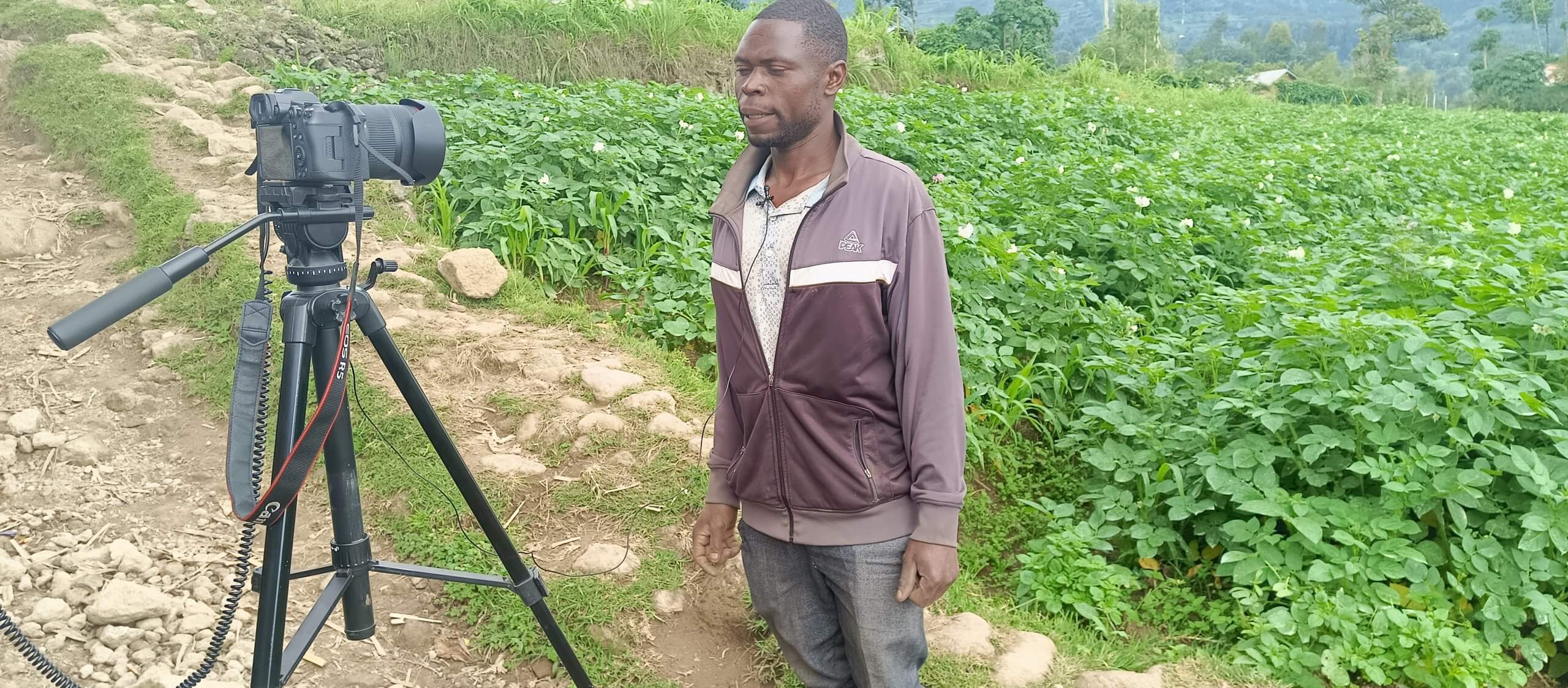
Monitoring and evaluation data collected jointly by the agronomists and the farmers backstopped by ASARECA during the Farmer field day and subsequent harvests showed that all 11 sites where ASARECA and partners provided certified seed performed commendably compared to the farmers practice of using recycled farm saved seed and poor agronomic practices. Going forward, the farmers will multiply the harvested seed and are expected to harvest 259 tonnes per hectare, further increasing availability and access to quality potato seed.
Working through the Innovation Platform model
As a Sub-Regional Inter-Governmental Organization of the National Agricultural Research and Extension Systems (NARES) of 15 Member States, ASARECA is mandated to regionally coordinate and convene human, physical, financial, and institutional capital to implement Agricultural Research for Development initiatives in Eastern and Central Africa. That is why ASARECA adopted the Innovation Platform approach in 2008 as a framework for scaling out proven gender responsive and climate smart agricultural Technologies, Innovations and Management Practices. Since then, ASARECA has been providing technical backstopping to stakeholders involved in facilitation of agricultural commodity-based IPs in the region.

